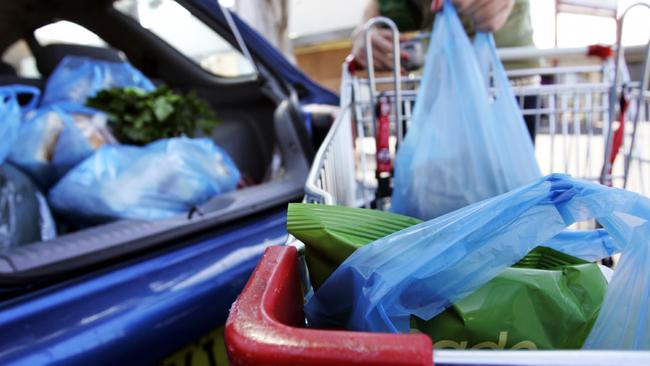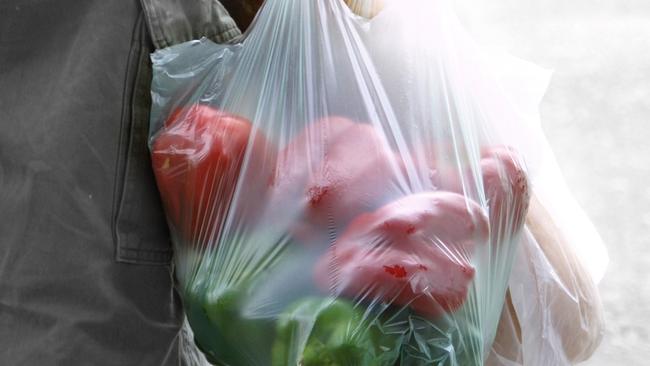Matt Johnston: Humble plastic bag is causing plenty of angst
WE all agree the number of discarded plastic bags is a problem but MPs are dithering on who should be responsible for a ban, writes Matt Johnston.

Opinion
Don't miss out on the headlines from Opinion. Followed categories will be added to My News.
I LOVE a bargain, so occasionally I go to a certain German-brand supermarket that sells everything from spreadable meat to nautical lights.
Often I arrive without my own shopping bags and begrudgingly fork out 15c a pop for new ones at the cash register. Back home I toss them on a growing mound in the pantry, alongside any spreadable meat-type impulse purchases, angry that I “did it again”.
Recently I’ve contemplated whether my memory would suddenly improve if there was a plastic bag ban in all supermarkets — something that is very much on the cards. Several states have already binned the type of bags you get at other supermarket cash registers, those that tend to fall apart before you even get your shopping home.
That was unpopular with many people who liked to reuse them. As a former dog walker, I found them handy to keep the streets clean, if you get my drift. The flip side was that those bags ended up in landfill and took forever to break down because they’re made from oil or similar products.
Clean Up Australia says so many bags end up in waterways they could cover the CBD.
The ACT banned the bags given out at supermarket checkouts in 2011 and has since found 70 per cent of people don’t want it overturned. No offence to my former Canberra colleagues and neighbours, but I’m not sure the ACT surveys always translate to other states’ views, however.

In Victoria, the Greens have tried to legislate to ban the bag. While that Bill won’t get through state parliament, there has been a parliamentary inquiry into it that has shed more light on the government’s thinking.
There’s no doubt about what the Greens think, with MP Samantha Dunn saying she finds it “perverse” that organic food would be wrapped in “a chemical wrap” such as plastic.
The inquiry has also heard from retail groups — that represent all businesses affected, not just the big supermarkets — that warn about costs. Heath Michael from the Australian Retailers Association told the inquiry that “other anti-litter laws are more effective measures to reduce waste” and that whatever the type of ban implemented there would be “an economic cost to either the customer or the retailer”.
From a government perspective, the Department of Environment’s climate change division executive director, Kath Rowley, said the Commonwealth “indicated” it would move to a legal ban in the event that a voluntary ban (talk about an oxymoron) does not deliver.
Rowley also pointed out the difficulty in banning all types of plastic bags, because if “sensible packaging” were dumped, environmental benefits would be outweighed if food spoils and is wasted. Rowley also noted that in Victoria, Environment Minister Lily D’Ambrosio gets a lot of letters about plastic bags.
“There are certainly more letters about the adverse impacts of plastic bags on the environment. There are certainly some letters, just fewer, saying, ‘Please don’t ban them, because they’re really handy and I use them for a whole bunch of useful things’.”
So which letter writers will win?
A few years ago there was a policy pushed by then premier Denis Napthine for a “cash for cans” scheme under which 10c would be returned for bottles or cans taken to collection points.
Business cracked it and said any costs would be shifted straight on to consumers and Daniel Andrews rejected the plan outright. Despite business anger, NSW set out to create its own container deposit scheme — although it’s recently been delayed by six months.

ON A plastic bag ban, both NSW and Victoria seem interested, but are keen to pass the buck between state and federal schemes.
There’s no doubt a bag ban would cost consumers, assuming some forget their own reusable ones, and that would be as popular as Dan Andrews at a volunteer firefighters’ party.
One Coalition MP has asked the big political question: “How much do we want to make people pay?” That MP thought there was little enthusiasm in parts of the community to pay more for things like plastic bags at the moment.
Where the Opposition ends up will be important, especially if the Greens and Labor team up to ban the bag and the Coalition starts a campaign to bag the bag ban.
A spokesman for D’Ambrosio said the government “is seeking a national approach but has not ruled out moving forward with a state ban” of checkout-style bags.
While I personally don’t think most people will care that much about a ban if bags for fruit and veg and meat are exempt, I’ve underestimated the politics of environment and the hip pocket before.
And unless someone actually takes ownership of the policy rather than say they prefer someone else do it, it might be some time before we have to fork out 15c a bag at non-German supermarkets.
Matt Johnston is state politics editor



